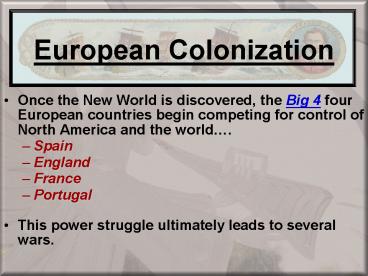European Colonization - PowerPoint PPT Presentation
1 / 25
Title:
European Colonization
Description:
European Colonization European Colonization Once the New World is discovered, the Big 4 four European countries begin competing for control of North America and the ... – PowerPoint PPT presentation
Number of Views:382
Avg rating:3.0/5.0
Title: European Colonization
1
European Colonization
European Colonization
- Once the New World is discovered, the Big 4 four
European countries begin competing for control of
North America and the world. - Spain
- England
- France
- Portugal
- This power struggle ultimately leads to several
wars.
2
F/I War 1750
3
The Spanish
- Spanish first to pursue colonization
- Start in Caribbean, then Central and South
Americamost important was conquest of Aztecs by
Cortez (1521) and Incas by Pizzaro (1531) - First permanent colonies in what will become
United States are founded by Spain - St. Augustine (Florida) is founded (1565) to
protect Spanish treasure fleets
4
(No Transcript)
5
Ferdinand Magellan the First Circumnavigation
of the World
6
The French
- French settle Quebec (1608) Montreal (1642) and
what would become Canada - Control St. Lawrence River access to interior
of North America - Develop a fur trade
- Coutier du Bois
7
(No Transcript)
8
Explorers Sailing For France
- Cartier - France - Reached St. Lawrence River -
Claimed Eastern Canada for France 1535 - Samuel de Champlain - France - Father of New
France - Established Quebec (the 1st permanent
French colony in N. America) - Established
settlements and explored Maine, Montreal Nova
Scotia - 1608
9
(No Transcript)
10
European Colonization
The Dutch
- Like French, Dutch focus on fur trade send only
a few men to settlements - Found Albany (New York, 1614) on Hudson River
- New Netherland (becomes New York) is an extension
of the Dutch global trade system - Dutch French form alliances with Native
Americansincrease warfare Iroquois (Dutch
ally) defeat Hurons
11
Explorers Sailing For The Netherlands
- Henry Hudson - English sailing for the Dutch -
Searching for Northwest Passage - Claimed Hudson
River - Settlers established New Netherlands (New
York) - 1609
12
(No Transcript)
13
(No Transcript)
14
history on slavery
HOW SLAVERY CAME TO THE U.S.
Indentured Servants Indentured servants became
the first means to meet this need for labor. In
return for free passage to Virginia, a laborer
worked for four to five years in the fields
before being granted freedom. The Crown rewarded
planters with 50 acres of land for every
inhabitant they brought to the New World.
Naturally, the colony began to expand. That
expansion was soon challenged by the Native
American confederacy formed and named after
Powhatan
15
Southern Colonies Maryland Virginia North
Carolina South Carolina Georgia
16
- Chesapeake Colonies
- Maryland
- Virginia
- Still part of the Southern Colonies
17
s.colonies
- Southern Colonies
- Indentured servants
- slavery to work the large plantations
- rice, tobacco and cotton
- fertile soil
- cities Charleston, Savannah Baltimore
- Maryland
- Virginia
- North Carolina
- South Carolina
- Georgia
18
(No Transcript)
19
CHART THIRTEEN COLONIES
Colony/Date Person Responsible
Why Founded Governed/Owner
Virginia---1607 Jamestown Joint Stock Company Virginia Company Captain John Smith John Rolfe Attract new settlers for Dutch and Swedish colonists Representative Govt House of Burgesses Royal Colony
Maryland--1634 Lord Baltimore Religious tolerationthose who believed in Christ---allowed persecuted Catholics to settle in Maryland Representative govt Proprietary Colony
North/South Carolina In 1663 John Locke 8 English nobles Setup a new colony based upon social classesFailed and divided into 2 parts Representative govt Royal Colony
Georgia1732 James Oglethorpe Provide a place for debtors could start a new life---Acted as a buffer against Spanish Florida Royal Colony
20
Colonization of Maryland
21
Restoration Colonies
- Restoration refers to the restoration to power of
an English monarch, Charles II, in 1660 following
a brief period of Puritan rule under Oliver
Cromwell - Carolinas, Georgia, New York, New Jersey,
Pennsylvania, Delaware
22
The Carolinas
- As a reward for helping him gain the throne,
Charles II granted a huge tract of land between
VA and Spanish Florida to 8 nobles in 1663 - The original proprietorship was broken into 2
royal colonies in 1729
23
Settling South Carolina
- Charles town was formed in 1670 by a few
colonists from England and some planters from the
island of Barbados - Initially, the economy was based on trading furs
and providing food for the West Indies - By the middle of the 18th century, large
rice-growing plantations worked by African slaves
created an economy and culture that resembled the
West Indies
24
- Although Carolina was geographically closer to
the Chesapeake colonies, it was culturally closer
to the West Indies in the seventeenth century
since its early settlersboth blacks and
whitescame from Barbados. - South Carolina retained close ties to the West
Indies for more than a century, long after many
of its subsequent settlers came from England,
Ireland, France, and elsewhere.
25
Democratic North Carolina
- Farmers from VA and New England established
small, self-sufficient tobacco farms - Region had few good harbors and poor
transportation so there were fewer large
plantations and less reliance on slavery - By the 18th century, the colony earned a
reputation for democratic views and autonomy from
British control
26
Georgia The Last Colony
- A proprietary colony and the only colony to
receive direct financial support from the home
government in London - Set up for 2 reasons
- Defensive buffer
- Rid Englands overcrowded jails of debtors
- Special Regulations
- Absolute ban on drinking rum
- Prohibition of slavery
- Colony did not thrive because of the constant
threat of Spanish attack - Taken over by the British government in 1752 when
Oglethorpe and his group gave up - Bans on slavery and rum dropped
- Colony grew slowly by adopting the plantation
system of South Carolina































